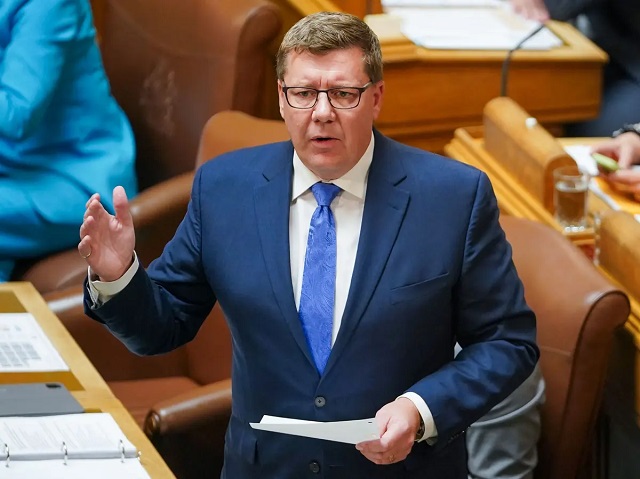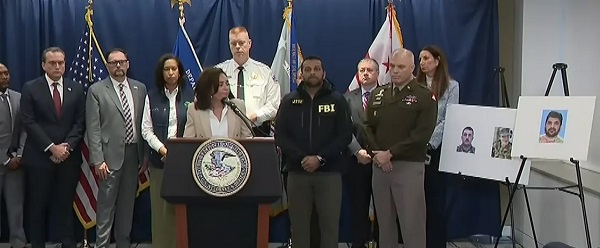
By Jaryn Crouson
Parents are growing increasingly concerned about the prevalence of technology in classrooms, and the negative side effects that change is fueling among children nationwide.
Ever since the COVID-19 pandemic pushed schools to remote learning, many have only grown increasingly reliant on technology, shifting assignments into digital forms and handing every student a computer or tablet to aid their education in the classroom. But after seeing their kids become angrier, less sociable and less educated, parents are asking where the teachers have gone.
“What are we doing with an iPad all day, for eight hours a day in our kids’ hands?” Patricia McCoy, a mother of four in Wyoming, told the Daily Caller News Foundation. “Honestly, it’s disturbing. They give your kids worksheets on the iPad. There’s no actual critical thinking happening because they’re given apps to replace the teachers.”
Even when parents ask for additional help for their struggling children, the solution at some schools always comes back to more technology.
“If your kid is struggling in math, instead of giving them tutoring, they’re going to recommend to you that your child use this app on their iPad to help teach them how to do this math,” McCoy continued. “But that app doesn’t teach them how to do the math. They enter the problem and it gives them the solution all written out and worked out, so there’s no critical thinking being done. The answer is being given to them. They have ChatGPT at the ready, and other things similar to ChatGPT, which, again, does all the thinking for them. And all they have to do is show up, log into the iPad, get the answers from one app, put it into another app and get the grade.”
This has some parents wondering where the teachers have gone and whether they are teaching their students at all.
“THEY DON’T WANT TO TEACH”
“Covid did create a lot of this, and it made it a lot easier for some of the teachers now to just place these kids in front of a screen,” Mike Maldonado, a California father of five, told the DCNF. “And it makes it easier for some of these teachers because they don’t want to teach. They’re just there for a job.”
“We can’t ignore the fact that all this stuff makes it easier on the teacher, which actually, I think produces a worse result, “Jaime Brennan, member of the Frederick County Board of Education who spoke on behalf of herself and not the board, told the DCNF. “When a teacher can go online and make up an assignment using AI, now they haven’t thought. Now they’re not using their brainpower, and it’s like a trickle down effect. We’ve already introduced screens and technology to the level that as humans, I don’t think we were designed to use, and we haven’t adapted to it very well.”
Critically, Brennan said, the use of AI has prevented students from developing automaticity, the skill of memorizing basic solutions, such as simple addition, to the point that you do not even think about it, which is a foundational skill students carry on throughout their education and adult life.
McCoy told the DCNF that the digital learning environment has left her youngest son academically “two to three years behind” his siblings, who did not go through this new screen-based school system.
“He is drastically farther behind academically,” McCoy said. “He does what he needs to to pass, but intellectually and academically, he is years behind his two brothers and his sister at this age, and that is sad and heartbreaking as a mother to know that I probably failed my child because I went along with what the school said was going to help them.”
Despite being “years behind,” McCoy’s son is on track to graduate on time.
“We graduate kids who have to go to community college and take remedial math,” Brennan mentioned. “Our kids leave 12th grade and they go to 13th grade. So we’re putting out kids that are not ready to operate in the regular world.”
POSSESSED BY THE SCREEN
Not only is she worried about his education, the concerned mom has seen a noticeable shift in her son’s mood as he is forced to rely on more and more screen time.
“I tried to take my son’s phone away one time, and it looked like a demon was looking back at me. My son was not looking at me,” McCoy recalled. “His eyes were completely black and cold. It was like he was a totally other person, like a drug addict, and you’re taking their drug from them. And he was 15 at the time.”
Without his phone, McCoy said her son was a new person.
“That week, he was a totally different person. He wasn’t overly tired and drowsy all day. He was actually interacting with the family and spending time with us. Instead of being shut down and closed off in his room, he was playing with our dogs more,” McCoy said.
Maldonado thinks these behavioral issues stem partly from the lack of human interaction children experience in increasingly screen-dependent classrooms.
“Part of the problem is that they’ve lost a lot of the interaction,” Maldonado said. “This is why some of these kids I think act out, because they don’t want to listen to the teacher. There has to be that communication between two people, two humans, and not a screen where they can’t really interact and get the tone, the voice inflection of a response.”
“That is a major issue,” Maldonado continued. “Without social skills, how do you function in society? And we see it all the time. Social skills are definitely learned, it’s a trait that you pick up from interacting with people when you’re young. And that’s the big thing, people don’t realize that if there’s no interaction, that person is going to be withdrawn, not just from the classroom, but from the home and from society.”
The issue is especially apparent in children who were younger during the Covid year, Maldonado said. The so-called “Covid babies” are typically “the ones who you can see have the majority of the behavioral issues.”
“It is hard to get some of these kids to actually look you in the eye and make eye contact. They don’t know human interaction,” Brennan concurred, adding that students today are not even dating as much as they used to. “I’m really concerned where that’s going to lead, and what our kids are going to be like. We’re already seeing negative impacts of kind of this disintegration, people are waiting till later to getting married. They’re not getting married.”
THE PRICE AMERICA IS PAYING
Meanwhile, as the use of artificial intelligence (AI) among youth increases, more data and stories are coming out revealing the tool often exposes children to inappropriate content, damages the development of critical thinking skills, and at times, drives kids to suicide by explicitly coaching them to do so. Brain scans from the Massachusetts Institute of Technology (MIT) revealed that brain engagement was severely diminished under participants who used AI compared to those who used a traditional search engine, and memory recall following assignments completed with AI tanked.
Interestingly, schools that struggle with budget concerns and often fail to see promised district-wide staff raises somehow find funds to buy brand-new devices for every student — even when they already had slightly older, but still functional devices.
“Most of [the money goes] to administration and fees and other things that have nothing to do with the education of our kids, or they spend it on these expensive iPads and technology that shouldn’t even be in the classrooms, and then they go to the state and say, ‘You’re not giving us enough money. We need more money,’” McCoy told the DCNF. “Well, we keep throwing money at the problem, but the problem doesn’t get better or go away. It gets worse every year. So clearly, money isn’t solving the issue on why our kids can’t read, write and do math.”
“Stop spending the money on the iPads and put that money back in the classrooms instead,” McCoy continued. “Give it to the teachers.”
While Tina Descovich, co-founder and CEO of parental advocacy group Moms for Liberty, mirrors the concerns of many parents, she also told the DCNF there could be a place for technology in the classroom.
“I think they have to be used in a very responsible fashion,” Descovich said. “There’s so many wonderful teachers that would like to use AI in a way to help enhance their skills and teach their children better.”
Moms for Liberty signed a pledge with the White House in September to help foster innovation and interest in AI with America’s youth.
Brennan remains concerned that technology in the classroom prevents kids from thinking independently and may harm future skill building rather than facilitate an interest or expertise in technology.
“Are you trying to keep pace with the kids who are learning to use the technology, or are you trying to create the kids who are going to develop the technology? Because those are two different things,” Brennan said. “So if we’re just teaching our kids to be technology consumers, then sure, the easy way out is to do everything on the technology. If you’re trying to keep teach kids to be the technology developers, they need to learn to think and process away from the technology. They need to have other skills that are not technology based.”
PARENTS STILL HAVE POWER
For parents concerned about the technological takeover of their children’s classrooms who feel like their schools aren’t listening to them, Descovich said that along with helping their kids at home when possible, parents should “rally with like minded parents.”
“Start educating your community,” Descovich said. “I think when parents really understand what’s happening and what the concerns are and what the risks are, they will want to take action. And when you have enough parents showing up at school board meetings and speaking about an issue we have, as we know, you definitely can make an impact, and they will listen.”
Related

















